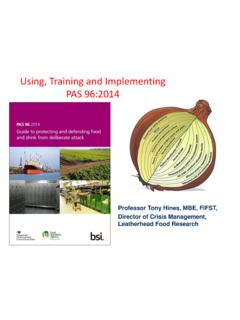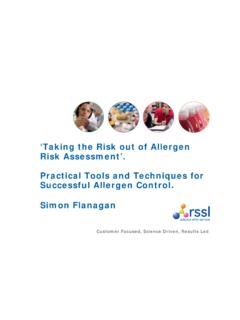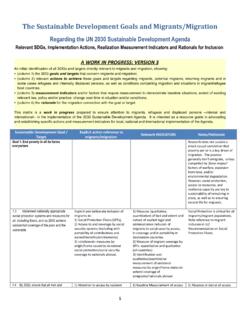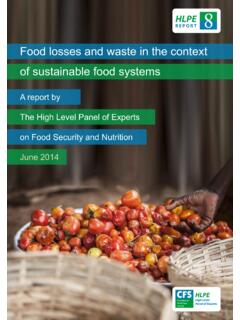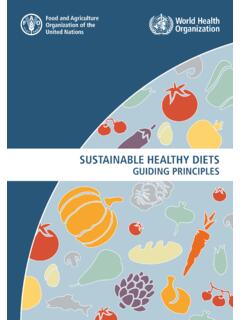Transcription of FOOD SYSTEM FRAMEWORK - IFST
1 food SYSTEM FRAMEWORKa focus on food sustainabilityINSTITUTE OF food SCIENCE + TECHNOLOGY food SYSTEM FRAMEWORK PAGE 2A word from the presidentThe sustainability of the food SYSTEM is critical, not just to those of us working in the sector, but to every citizen on the planet we are all consumers and we will all be affected by resource pressures, climate change and subsequent social and economic changes. Much good work is underway, and exciting new technologies are being developed to address the many challenges. IFST is committed to working with interested partners to help speed progress in key areas, or to bring focus to needs that may be currently overlooked. This report is the first step in that process, a FRAMEWORK to identify where IFST can and should get involved, to maximise our impact in this broad endeavour.
2 We will be speaking out more as we develop our activities; we welcome your comments and offers of involvement. David Gregory, IFST PresidentINSTITUTE OF food SCIENCE + TECHNOLOGY food SYSTEM FRAMEWORK PAGE 3 ContentsEXECUTIVE SUMMARY 4 INTRODUCTION 6 What is the food SYSTEM ? 6 RESOURCE PRESSURES & RISKS 8 Agri- food intensification & consolidation 8 Land use 9 Local & global environmental limits 11 DECENT WORK & EQUITABLE TRADE 12 Human rights and a living wage 12 Smallholder agriculture 13 Increasing automation and mechanisation 13 SUSTAINABLE DIETS 14 Impacts of consumer diets and lifestyles 15 Alternative proteins 16 NOVEL PRODUCTION SYSTEMS & INGREDIENTS 17 Farming SYSTEM innovation 17 Livestock feed alternatives 18 Novel ingredients 19 CIRCULAR ECONOMY AND SUSTAINABLE MANUFACTURING 21 Circular food economy 22 food waste 23 Packaging innovation and education 24 TRANSPARENCY.
3 TRACEABILITY & TRUST 25 Transparency and disclosure 25 food chain data 26 Standards & certification 26 CONCLUSIONS & RECOMMENDATIONS 27 General recommendations 27 Recommendations against key themes 28 ANNEX RESEARCH APPROACH 31 INSTITUTE OF food SCIENCE + TECHNOLOGY food SYSTEM FRAMEWORK PAGE 4 EXECUTIVE SUMMARYT here is a clear and urgent need for science and applied technologies to help deliver sustainable food systems, which provide food security and nutrition for all in such a way that the economic, social and environmental bases to generate food security and nutrition for future generations are not compromised (FAO, High Level Panel of Experts on food security and nutrition). IFST as the Voice of the food Profession is well placed to bring focus to important aspects of developing sustainable food systems.
4 To direct our efforts in what is a wide topic area, we have commissioned this report by 3 Keel to focus activity on practical elements where we can have an impact that is most relevant to our members, and also benefit wider society. The report outlines 6 key themes that provide a FRAMEWORK for IFST to develop guidance, new knowledge, policy, and other initiatives to support the vision of sustainable food systems, while keeping a focus on food , technology and evidence. Recommendations for broad activity areas are made under each of these themes:1. Resource risks and pressures the food SYSTEM is dependent on the natural environment and at the same time is causing significant environmental impacts. IFST can contribute to UK and global efforts to increase food SYSTEM resilience through: Developing guidance for food industry on mitigating the impact of emerging global environmental risks Supporting research to identify how food science and technology could help the industry adapt to the impacts of climate change Identifying how a broader set of environmental and social risks can be integrated into food business and supply chain risk management.
5 Being a vocal supporter of efforts to address climate change mitigation and adaptation in the food Healthy sustainable diets there is a need to deliver good human and environmental health outcomes from the food SYSTEM at the same time. Partnering with appropriate technical colleagues, IFST can: Help develop and disseminate best practice guidance on how to incorporate sustainability into the assessment of new processes and products, Designing in sustainability to NPD or R&D processes Contribute to the development of solutions to the global challenge of food and nutritional waste through the application of science and technology3. Circular economy and sustainable manufacturing the current economic model of take-produce-consume-discard is unsustainable.
6 IFST can: Address food safety and regulatory perspective challenges to support the increased use of wastes and by-products as inputs to other processes and sectors Support and promote industry efforts to increase resource efficiency through reducing energy, waste and water in the food industry Facilitate the creation of new practical energy standards, for SMEs Support optimisation of the usability of foods through the improvement of product date/storage/usage labelling informationINSTITUTE OF food SCIENCE + TECHNOLOGY food SYSTEM FRAMEWORK PAGE 54. Novel production systems and ingredients there are opportunities for developing new farming and manufacturing technologies to deliver sustainable nutrition. IFST can: Contribute to the technical, legal, and consumer-acceptability challenges of future protein technologies Promote or support research into automation and increased use of data-enabled technology and artificial intelligence in the food SYSTEM 5.
7 Decent work and equitable trade the livelihoods and working conditions of the 1+ billion people who work in the food SYSTEM need to be improved. IFST can: Explore the advantages and disadvantages of a move towards more automation in the agri- food supply chain 6. Transparency, traceability and trust new software and data can help drive improvements in food SYSTEM sustainability and strengthen consumer trust. IFST can: Increase industry knowledge of emerging traceability and transparency technologies in supply chains Support development and uptake of innovative approaches to assuring the sustainability of supply chain actorsIFST and its member working group will now use this FRAMEWORK and the recommendations to develop more specific activities, which will need to be addressed in conjunction with the many organisations and individuals who are affected by, or are already working in, these areas.
8 The report identifies some of those key stakeholders as potential partners, and IFST is open to discussion and collaboration with these and other interested parties. For more information or to initiate that discussion please contact John Bassett, Policy and Scientific Development Director, IFST at INSTITUTE OF food SCIENCE + TECHNOLOGY food SYSTEM FRAMEWORK PAGE 6 INTRODUCTIONWhat is the food SYSTEM ?According to the United Nations Environment Programme (UNEP) the food SYSTEM can be defined as the complete set of people, institutions, activities, processes, and infrastructure involved in producing and consuming food for a given population .1 This covers all stages of the value chain - from growing and harvesting agricultural products through to processing, packaging, transporting, selling, cooking, consuming, and the disposal of waste food and packaging.
9 A key characteristic of the food SYSTEM is the extensive linkages, interdependencies and feedback loops between value chain stages and the wider environment, society and economy. For example, the food SYSTEM is dependent on natural resources and has a significant impact on the global environment. The food SYSTEM also has a major influence on human health and is an important global source of employment and economic value. It also has significant cultural significance in many societies. Growing environmental pressures, including climate change, soil degradation, disruption of water cycles, expanding pathogen ranges and increasing regularity of extreme weather events, coupled with population growth and migration impact on and will continue to affect the food SYSTEM .
10 The complexity of the food SYSTEM means that a systems (or joined up ) approach is necessary if effective policy responses are to be developed by business and government. For example, a systems approach would avoid the situation where countries subsidise the production of nutritionally poor and environmentally damaging foods while at the same pay the increasing costs of diet-related diseases and document explores the key components of the global food SYSTEM via the lens of six themes identified of being of particular relevance to IFST (see Figure 1 below): Resource risks and pressures The food SYSTEM is dependent on the natural environment and at the same time is causing significant environmental impacts Healthy sustainable diets There is a need to deliver good human and environmental health outcomes from the food SYSTEM at the same time Circular economy and sustainable manufacturing The current economic model of take-produce-consume-discard is unsustainable Novel production systems and ingredients There are opportunities for developing new farming and manufacturing technologies to deliver sustainable nutrition Decent work and equitable trade The livelihoods and working conditions of the 1+ billion people who work in the food SYSTEM need to be improved1 UNEP (2016)


